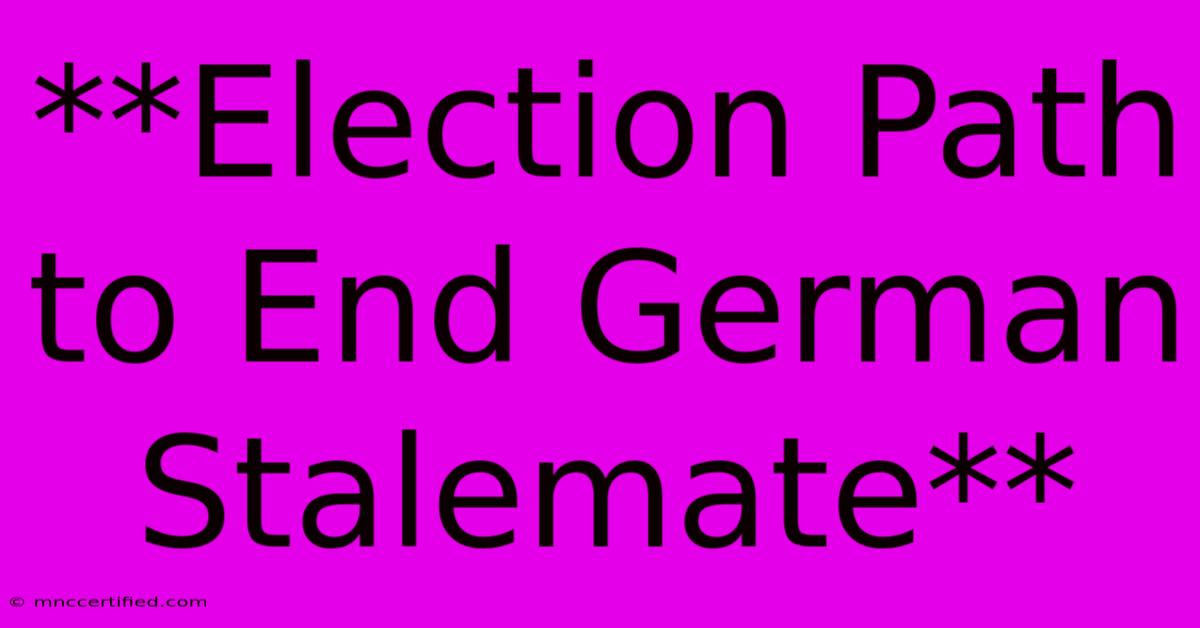**Election Path To End German Stalemate**

Table of Contents
Election Path to End German Stalemate: A Look at the 2021 Bundestag Election
Germany has faced a political stalemate for the past four years, with no clear majority emerging after the 2017 Bundestag election. This led to a grand coalition between the Christian Democratic Union (CDU) and the Social Democratic Party (SPD), but it was fraught with internal friction and a lack of clear direction.
The 2021 election offered a chance to break the deadlock. With Angela Merkel stepping down after 16 years as Chancellor, the stage was set for a new political era. But the outcome was still uncertain, as the political landscape had shifted significantly in the years leading up to the election.
The Rise of the Greens and the AfD
Two parties emerged as significant forces in the 2021 election: the Green Party and the Alternative for Germany (AfD).
- The Greens, driven by a strong environmental platform, gained significant support, particularly among younger voters.
- The AfD, a right-wing populist party, continued to attract voters with its anti-immigrant and nationalist rhetoric.
The Election Results
The 2021 election saw a fragmented political landscape with no single party achieving a majority. The results were as follows:
- CDU/CSU: 24.1%
- SPD: 25.7%
- Greens: 14.8%
- FDP: 11.5%
- AfD: 10.3%
- Left Party: 4.9%
Forming a Government: The Challenges
The election results presented a significant challenge for forming a stable government. Several potential coalition scenarios emerged:
- Traffic Light Coalition: This coalition, consisting of the SPD, Greens, and FDP, was seen as the most likely outcome. However, negotiating a workable agreement proved challenging due to differing policy positions on issues such as climate change and taxation.
- Jamaica Coalition: A coalition between the CDU/CSU, Greens, and FDP, named after the Jamaican flag, was another possibility. However, this option faced significant hurdles, particularly on issues like immigration and social welfare.
- Grand Coalition 2.0: While the prospect of another grand coalition between the CDU/CSU and SPD seemed unlikely, it remained a possibility if other options failed to materialize.
The Impact of the Election on German Politics
The 2021 Bundestag election marked a significant shift in German politics.
- The rise of the Greens and the AfD reflected changing voter priorities and a growing dissatisfaction with traditional political parties.
- The fragmented political landscape presented a significant challenge for forming a stable government, potentially leading to prolonged negotiations and political instability.
Moving Forward: The Future of German Politics
The 2021 election had a significant impact on the future of German politics.
- The new government would face the crucial task of navigating the country through the COVID-19 pandemic and addressing the growing challenges of climate change and social inequality.
- The fragmented political landscape might lead to a more complex and dynamic political system, with a stronger focus on compromise and collaboration.
The 2021 Bundestag election represented a turning point in German politics, ushering in a new era characterized by uncertainty and potential for change. Only time will tell how the new government will address the challenges facing Germany and shape the future of the country.

Thank you for visiting our website wich cover about **Election Path To End German Stalemate** . We hope the information provided has been useful to you. Feel free to contact us if you have any questions or need further assistance. See you next time and dont miss to bookmark.
Featured Posts
-
Does Insurance Cover Botox For Neck Pain
Nov 08, 2024
-
Does Hyundai Lease Include Gap Insurance
Nov 08, 2024
-
No Return For Sancho Palmer In Training
Nov 08, 2024
-
Farm Bureau Liability Insurance Coverage
Nov 08, 2024
-
Aclu Georgia Opposes Fulton County Plan
Nov 08, 2024